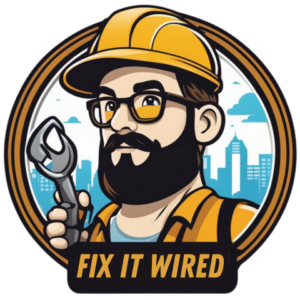Utility companies provide different electrical services based on the area’s needs. The standard houses will work fine with services between 100 amps and 200 amps. So, what if the service is 100 amps, but you have a 125 amp panel?
You can use a 125 amp panel for a 100 amp service. Although the NEC recommends using a panel to match the incoming service load, a slightly larger panel is fine, especially if you have plans to add extra circuits. However, you must always check your local codes before making a decision.
Check the building codes for such a setting. This article will discuss a few basics of electrical service, the possibility of using an oversized panel, the pros and cons, and a few safety considerations. So, let’s begin without further delay.
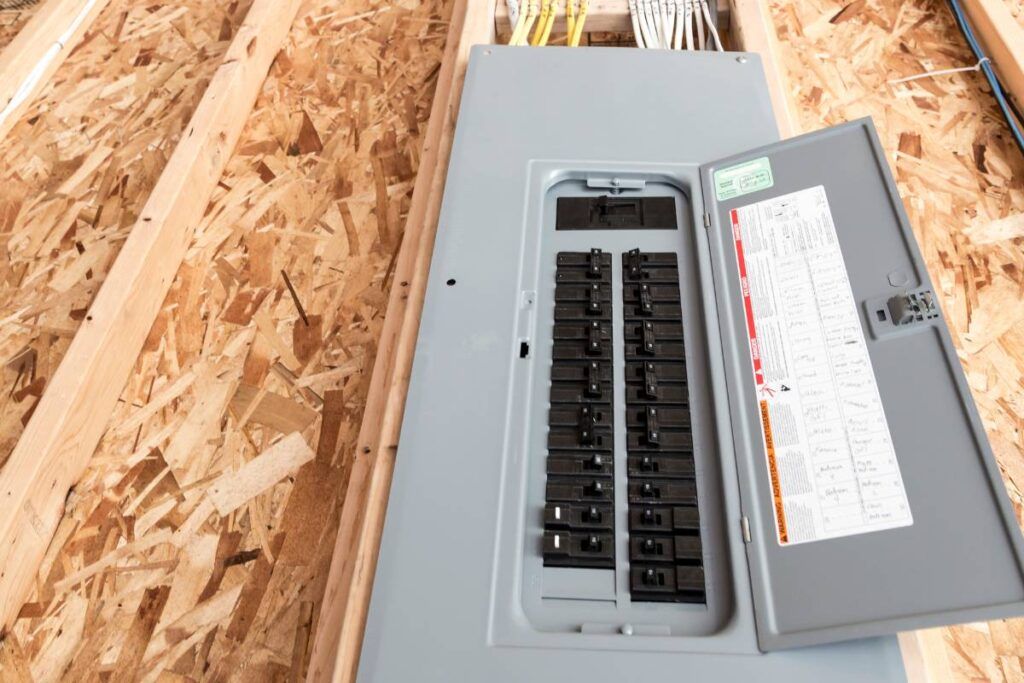
Check out our list of top-handpicked products for all your electrical, appliance, and HVAC system needs to keep your home running smoothly.
This post includes some affiliate links.Understanding Amps, Volts, and Panels
Electricity is an integral part of our daily lives. But many of us are unaware of terms like amps, volts, watts, panels, etc.
Here, we shall discuss a few basics for a clear concept and understanding of electricity and its services.
Amps, or ampere, is the unit measurement for the electrical current.
It is the rate of current flowing through the circuit or the number of electrons through the wire.
Volt is the measurement of the electric potential at which the electrical system flows through the system.
You can also describe it as the individual electron speed when they move through a circuit.
The electrical service is delivered to our houses by the utility companies, which has a fixed limit to be enough for the area.
100 and 200 amps are the average capacity for standard houses.
The service will reach your home through the overhead wires or the electrical meter and stop in the main panel.
The main panel is a distributor to split the current all over your house through the branch circuits.
Can a 125 amp panel be used with a 100 amp service?
Generally, experts do not recommend using an electric panel with amperages lower than that of the incoming service.
The capacity of the electrical service helps you determine the correct amount of current that can safely flow through your house.
If you use a panel higher than the electrical service amp, it may not be protected properly.
As a result, the panel will suffer during overloading and short circuits.
However, you can use a slightly higher amp panel for your house if the incoming service is 100 amps.
One of my electrical engineer friends used to have a 125 amps panel for 100 amps service.
But now, he uses 200 amps service and breaker box due to the increased appliance usage.
A 125 amp panel will efficiently handle the 100 amps electrical service load and allow you to use extra circuits in the future without changing or upgrading the panel.
Small houses with a few electrical devices, including 1-2 heavy-duty appliances, use 125 amps.
Besides, all the appliances do not run at the same time. So, 125 amps will be enough for such houses.
Suppose you have plans to add electrical loads to your house.
You can use a panel with a slightly higher amperage rating than your electrical service.
Before you use a 125 amp panel for a 100 amp service, you should consult the local building codes.
You can only use the panel if you have permission. Otherwise, you are allowed to install only a 100 amps panel.
Also read:
- Can I Use A 200 Amp Breaker Box With 100 Amp Service?
- Can I Use A 200 Amp Circuit Breaker With A 100 Amp Panel?
Common electrical problems while using a 125-amp panel for a 100-amp service
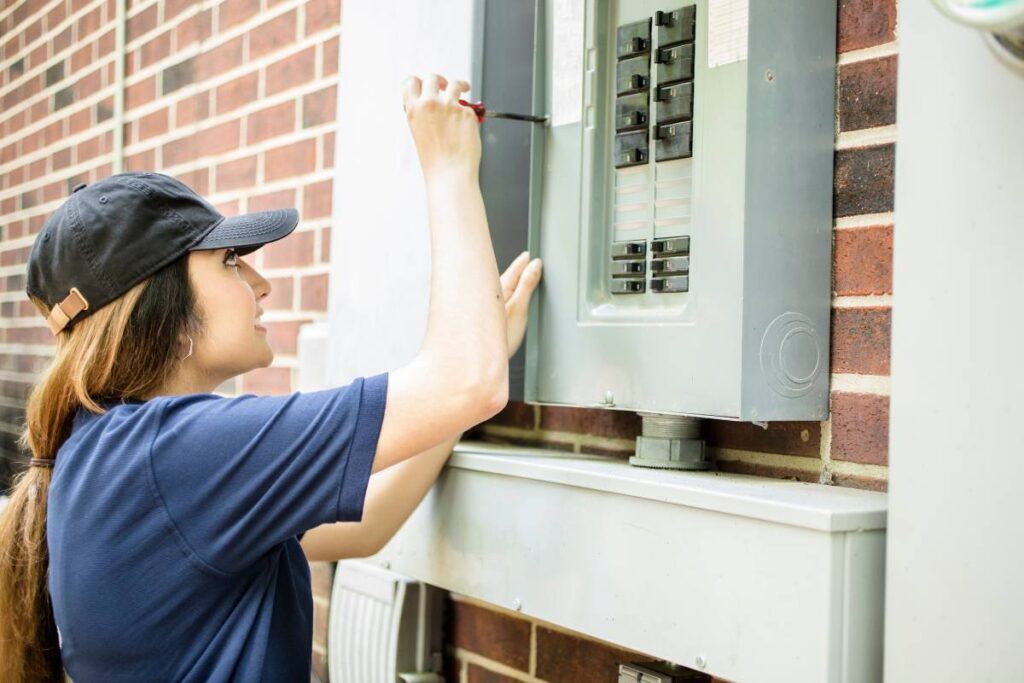
While installing a 125 amp panel for a 100 amp service, you may face a few issues, like overloading, overheating, electrical short circuits, and reduced electrical system life. The following are the issues:
- Since the panel is 125 amps, the circuits can draw current up to 100 amps. But for 100 amps, you get to use only 80 amps based on the 80% rule. If the full 100 amps get utilized, the service will get overloaded, trip the breaker panel, and damage the electrical system.
- Due to the overloading, the panel will get overheated, especially if the wire size is only 100 amps. The wires will heat up due to the excess current flow, melt and start a fire.
- Due to the mismatch between the panel size and electrical service capacity, the current can flow in obligatory ways, especially when the full 100 amps gets utilized. As a result, it will try to flow in unintended ways and cause short circuits. You cannot control or direct the current flow to the right path.
- Using 125 amps for 100 amps service will benefit you in many ways. But since it is a matter of electricity, the panel has to face several issues in the future. A mismatched breaker box does not guarantee proper protection or installation. So, it may damage faster and have a reduced lifespan due to regular wear and tear.
How to fix the problems?
A slightly bigger panel doesn’t necessarily hurt the electrical service.
But, it is still better to use a panel that can match the electrical service and handles the load.
The best solution for the above problems is you use a 100 amp panel for a 100 amps service.
The 100 amp panel can efficiently handle the load of the 100 amp service and provide your house with the required electricity.
The panel will be properly protected and installed to handle all overload and short circuits.
You won’t be able to use any extra amps and create overloads.
Another way is to upgrade your electrical service to 125 amps.
Two more minor solutions include:
- Using a thicker wire so that the wires don’t overheat and melt.
- Running appliances wisely so that only 80 amps of current is utilized because of the incoming 100 amps service.
Evaluating electrical needs
You must evaluate your house’s electrical needs for proper electrical service and the right panel size.
You can get the electrical needs by counting the number of appliances you plan to install and calculating their current capacity.
The electrical service should be enough for the appliances you have in your house.
Additionally, the panel you install must provide enough current to these appliances.
Here are some ways to evaluate the electrical needs:
- Check the appliances and devices you plan to install in your house, including small and large ones.
- Find the power consumption for each appliance. It will be mentioned on the label in the owner’s manual in watts.
- Calculate the power consumption to find out the electrical load of your house.
- Determine the service in voltage and find out the amperage. In the US residentials, it is mostly 100 and 200 amps with 120/240 volts.
- To find out the amperage, divide the wattage by volts.
- Find out the number of circuits you need based on the number of appliances in your house.
- Ultimately, it is always better to consult an electrician before deciding and confirming anything. He will be able to evaluate the electrical needs of your house and suggest the right electrical service and panel size.
Upgrading your electrical service: Is it necessary?
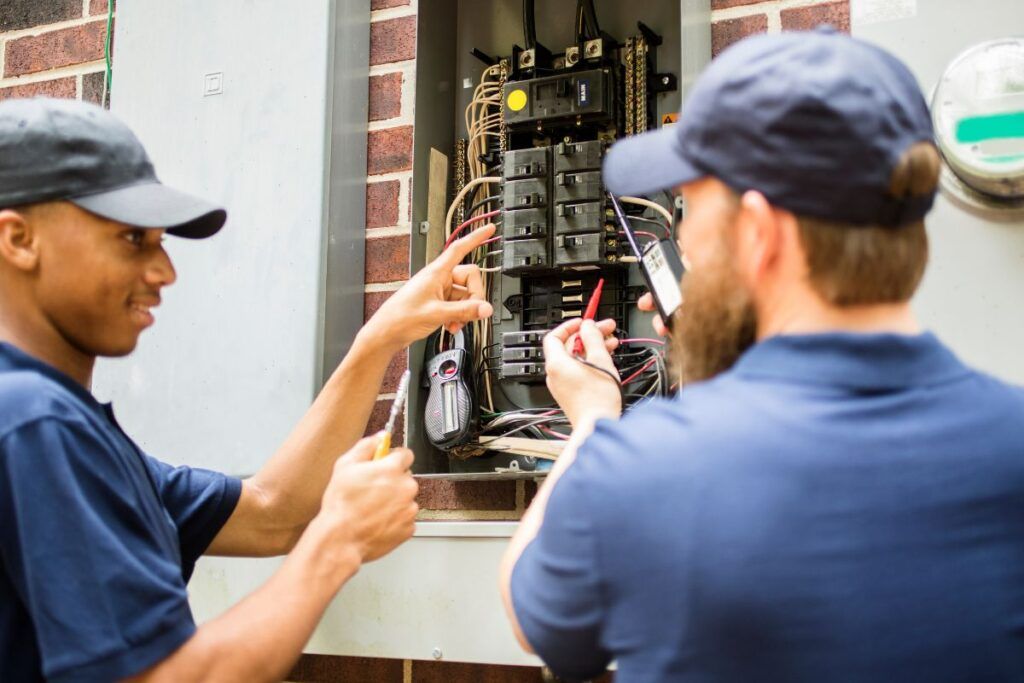
The electrical panel size tells you the amount of electrical current your house can receive.
But, if the size is larger than the incoming electrical service, there will be a few empty slots in your panel.
So, you may be unable to use the 125 amps panel fully.
If you use a 125 amp panel for your house, experts recommend upgrading the electrical service for the incoming power.
As I mentioned, the panel size must match the incoming electrical service to remain protected from overloading and short-circuit issues.
Additionally, the panel will have a few empty slots because you will have to use appliances according to the power you receive from the electrical service.
It can further create confusion in troubleshooting problems related to the panel.
However, upgrading the service to 125 amps may not be necessary if your region’s local code allows such a setting.
Using a panel size slightly larger than the incoming power is fine.
It gives you room for more circuits for future needs.
A 125 amp panel can easily hold the incoming 100 amp service load without issues.
But you must always consult a licensed electrician before deciding anything to ask whether you need to upgrade the service or not.
Since it is an electrical concern, you do not want to end up with something dangerous.
Safety considerations while upgrading your electrical system
You should follow a few safety considerations while upgrading your house’s electrical system.
- Before you upgrade the service, check with the local building codes for permission.
- If you upgrade your panel, upgrade the panel and service to match the electrical loads.
- Wire size is very important. Make sure you use the right wire size for the electrical service. The right wire size for 125 amps is 1-2 AWG wire. You can go for a thicker wire but do not reduce the size.
- Install GFCI breakers and outlets in your house for extra protection. GFCIs can trip whenever it senses danger and saves you from serious electrical accidents.
- Ensure that the new electrical system can provide enough current capacity for all the appliances in your house and handle the incoming service load.
- Contact a licensed and qualified electrician to upgrade the 125 amp service.
What to consider before installing a 125 amp panel?
The electrical panel size tells you the amount of electrical current your house can receive.
You cannot use the panel at full capacity if the incoming service is lower than the panel size.
So, if you have a 100 amp service and you install a 125 amp panel, consider a few things before installing the panel:
- Make sure that the 125 amp panel can provide enough current to the devices and appliances of your house.
- Use a thicker wire for installing the 125 amps panel. A 1-2 AWG wire is good for the panel size.
- Check that you have enough space to install a 125 amp panel. Check the panel dimensions, clearance, ventilation, and maintenance.
- Since it is electrical work, you should take proper precautions like turning off the power at the mains and wearing protective gear like gloves and goggles.
- You need permission to install the 125 amps panel, especially if the incoming service does not match the panel size.
- Hire licensed electricians to install the panel.
Pros and cons of using a 125 amp panel with 100 amp service

Though using a panel size that matches the incoming electrical service in your house is always recommended, you can go for a slightly higher panel size.
Using a 125 amp panel for a 100 amp service has various pros and cons. Below are a few of them.
Pros
- The 125 amp panel will be able to carry more load than the incoming 100 amp service. So, there are no risks of overloading.
- With a larger panel size, you can add extra circuits for adding appliances in the future.
- If you have plans to add extra appliances and devices, you do not have to change the panel. You only need to upgrade your electrical service by contacting the utility company.
Cons
- A 100 amp panel will be enough for a 100 amp service. If you choose 125 amps, the panel price will be more than 100 amp panels.
- Since the panel and service amp is a mismatch, there might be risks of damage to the electrical system if the panel is not installed and protected properly.
- You cannot use the 125 amp panel at full capacity because the incoming service is lower than the panel size.
- The building code regulations may not permit using an oversized panel compared to the service amp. You will have to replace the panel, spend extra money, and pay penalty charges.
- If ever there is a problem with your 125 amp panel, the insurance company will not help you to cover the damage. Using a 125 amp panel for a 100 amp incoming service will be a Code Violation.
Finding a qualified electrician for your electrical needs
Finding a qualified electrician for your electrical needs is very important.
Today, most of us are acquainted with little electrical work.
Since the charges of calling an electrician are high, we try to solve the smaller issues ourselves.
But bigger projects like upgrading a service or installing a panel will need licensed electricians and contractors.
They will help you upgrade the system and give you ideas about the rules and regulations, safety measures, maintenance, and installing the panel safely without any mistakes.
So if you are up for a bigger project, look for licensed electricians.
Depending on the project type, you will have three electrician options:
- Apprentice electricians are not licensed and need to work under supervision.
- Journeyman electricians are licensed and do not require any supervision.
- Master electricians have high certificate levels and licenses. Most electricians do not have such a qualification as it needs 4,000 hours of work, own contractors, and licensed organizations.
For choosing a good and qualified electrician, check the following things:
- Plan your full project and look for someone capable enough of such work.
- Gather information about the electrician’s qualifications and work experience.
- The electrician must have a valid license for attempting all types of electrical projects and should acquire success in most works.
- Based on the project type, choose the electrician – apprentice, journeyman, or master.
- Check what warranty and offers they can offer you.
- Discuss the local building codes and labor charges for installing the panel and upgrading the service.
- Ask the contractors and previous electricians you know or worked with for suggestions and assurance.
- It would be better if the electrician could carry an insurance policy so that both owner and the electrician do not have to worry about future damages.
Exploring alternative solutions to upgrading your electrical system
Experts recommend upgrading the electrical service to 125 amps if you use a 125 amp breaker panel.
Instead of that, there are other alternatives:
Changing the wire size
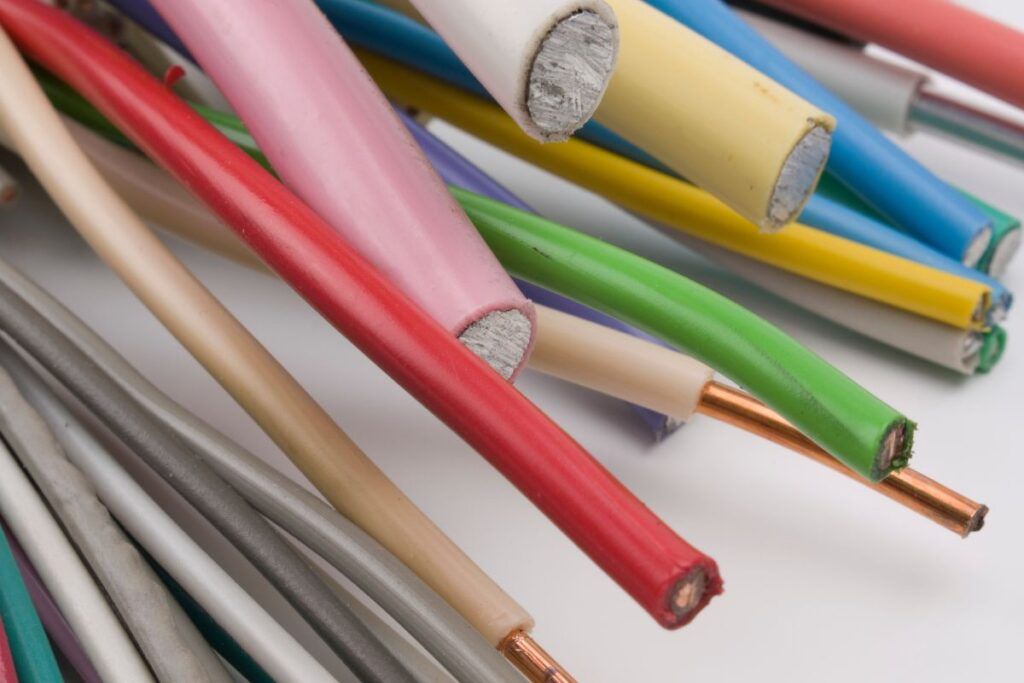
Suppose your region allows you to use a panel larger than the incoming electrical service.
In that case, you do not have to change the panel or the service.
For a better current flow, use a thicker one that can handle the current load of 100 amps and 125 amps.
The 2-4 AWG wire you use for 100 amps won’t be able to carry the current load flowing in the 125 amp panel, especially if you add extra circuits in the future.
A 1-2 AWG wire will be thicker and easily carry the current load of the service and panel.
Using a 100 amp panel
Instead of upgrading the service, know the service of your region and use a 100 amp panel.
It will ensure the protection and security of your panel during overloads and short circuits.
Since experts recommend using a panel that matches the incoming load, a 100 amp panel would be a great choice.
Using 125 amp panels stops you from changing the panel when you want to increase circuits.
But, there is no guarantee that the panel will remain safe during short circuits or faults with 100 amps service.
Consult your electrician.
Reducing appliance usage
You can use a 125 amp panel for 100 amp service if you do not intend to use it to its full capacity.
As I mentioned, you can use only 100 amps for 125 amps and 80 amps for 100 amps.
So, if you utilize only 80 amps despite using a 125 amps panel, there won’t be any issue.
You do not need to upgrade your electrical service.
Final thoughts
Contractors suggest using an electrical panel that matches the incoming service. However, you can install a slightly larger panel to add more extra circuits in the future. But it should not be too large.
So, if you receive a 100 amp service, you can use a 125 amp panel. With this, you receive extra room for more circuits and appliances without upgrading.
But, it comes with drawbacks like high cost, improper panel protection, inability to use the panel at full capacity due to low incoming service, etc. Before installing, consult a licensed electrician and discuss the local building codes for such a panel.
How many circuit breakers can you add in a 125 amp panel?
You can use 25 full-sized circuit breakers in a 125 amp panel. You can also add a few heavy-duty appliances because you won’t be running them together. So there won’t be any overloading.
What size of wire is good for a 125 amp service?
Use a #2 AWG copper wire or #1 AWG aluminum or copper-clad aluminum wire for 125 amps. For a 125-amp panel and 100-amp incoming service, use the same wire size to protect both.
Reference: Distribution board Wikipedia
